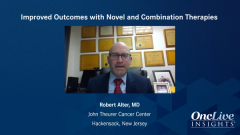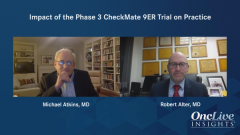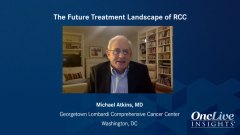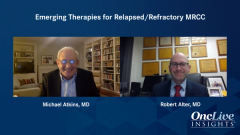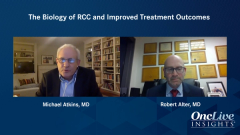
Impact of the Phase 3 CheckMate 9ER Trial on Practice
Episodes in this series

Robert Alter, MD: There is also what Toni Choueiri recently presented at ESMO [European Society for Medical Oncology Congress], which was the CheckMate 9ER study. This initially had 3 arms, but it subsequently went down to 2 arms. It studied the utilization of cabozantinib and nivolumab against again the standard-of-care arm, Sutent [sunitinib]. Sutent [sunitinib] was being given at the typical 50-mg dose with 4 weeks on and 2 weeks off. The nivolumab was given every 2 weeks, and the cabozantinib was given at a starting dose of 40 mg.
The data were presented with the primary end point of progression-free survival [PFS] by blinded, independent central review. The secondary end points were overall survival, response rates, and safety. There was an 18-month median follow-up with these patients with progression-free survival as the primary end point. For patients receiving the combination, the PFS was 16.6 months compared with 8.3 months with Sutent [sunitinib] as a single agent, which is similar to what we’re seeing with how Sutent [sunitinib] has been ending.
The response rate was almost doubled: People receiving cabozantinib-nivolumab had a response rate of almost 56%, while patients taking Sutent [sunitinib] had a 27% response. There was an 8% CR [complete response] rate utilizing cabozantinib-nivolumab where we’re back to durable therapy.
The median duration of patients on the study for cabozantinib-nivolumab was more than 20 months, and for Sutent [sunitinib], it was 11 months. There were still some treatment-related adverse events similar to what one would expect. It was similar to using combination I/O [immuno-oncology]–TKI [tyrosine kinase inhibitor] therapy.
This is starting a new conversation about having a newer player where we have a little more data. It may be soon enough, but it’s still not FDA approved. It’s still going through discussions. Is this soon going to be a new practice-changing regimen that’s going to be awarded to us? This may be a conversation.
Michael Atkins, MD: I’m sure it will be FDA approved. Cabozantinib-nivolumab is certainly a good combination, so it’s not surprising that it’s better than sunitinib because cabozantinib is a better drug than sunitinib. The patients are getting not only cabozantinib but also nivolumab. The efficacy data appear to be at least as good as axitinib-pembrolizumab, especially when you’re considering that there are more patients with intermediate risk than there were patients with poor risk on the protocol, and the doses used were a lot less than the standard dose of cabozantinib, which is typically starting at 60 mg. Here, the patients started at 40 mg, and half the patients were down to 20 mg of cabozantinib because of toxicity. It suggests that the nivolumab was contributing in a major way to the benefit of the cabozantinib. But it was also a bit surprising how tolerable the regimen was, especially because when we were combining TKIs early on—such as sunitinib or pazopanib—with single-agent anti–PD-1 agents—such as nivolumab or pembrolizumab—those combinations were not felt to be tolerable. Therefore, we moved to things like axitinib and bevacizumab that were cleaner VEGF-blocking agents in order to avoid off-target toxicity.
Cabozantinib has a lot of extra targets that one might have thought might have contributed to toxicity without adding to efficacy, but at least at the doses used, it didn’t seem to be much of a problem, and patients were able to keep on the therapy. I’m not sure how big an impact it’s ultimately going to have on treatment use because a lot of people have gotten comfortable with axitinib-pembrolizumab if they’re going to use a TKI and an anti–PD-1 together. You can probably comment on this better than I can, but my sense is that people who are seeing maybe 5 or fewer patients with metastatic kidney cancer a year and have gotten used to giving axitinib-pembrolizumab are not going to be that quick to change to another regimen that isn’t clearly superior to it.
Transcript Edited for Clarity



